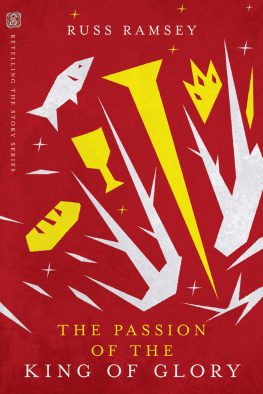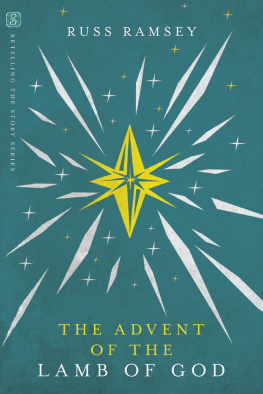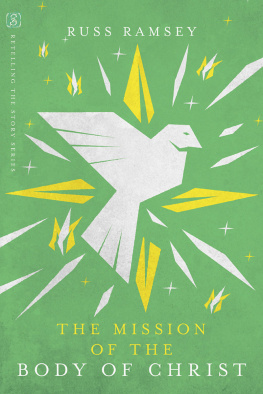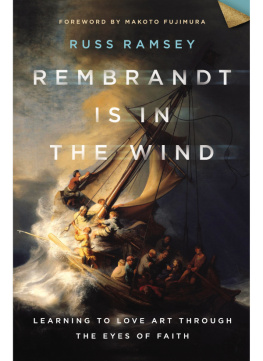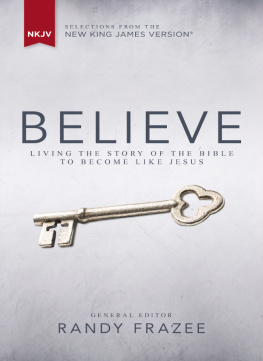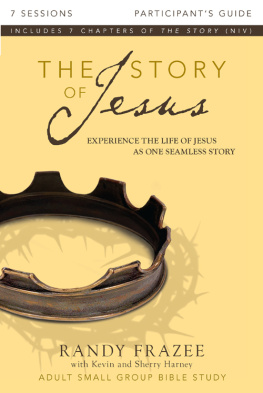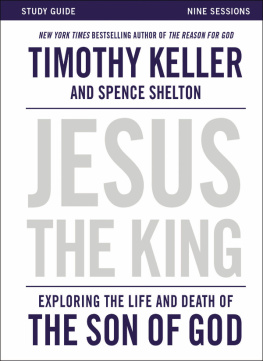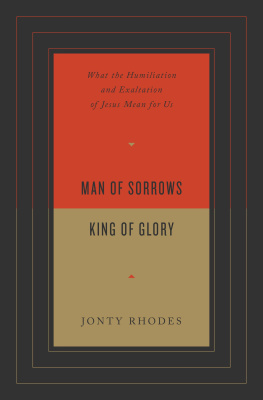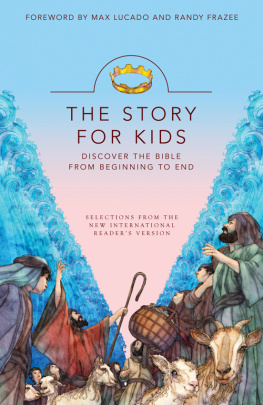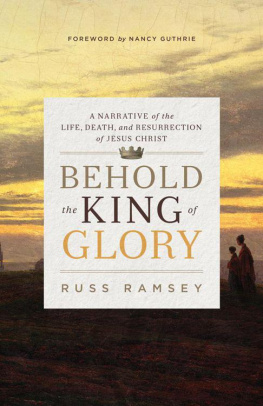Sommaire
Pagination de l'dition papier
Guide
InterVarsity Press
P.O. Box 1400, Downers Grove, IL 60515-1426
ivpress.com
2018 by Russell Brown Ramsey
Originally published as Behold the King of Glory by Crossway in 2015.
All rights reserved. No part of this book may be reproduced in any form without written permission from InterVarsity Press.
InterVarsity Pressis the book-publishing division of InterVarsity Christian Fellowship/USA, a movement of students and faculty active on campus at hundreds of universities, colleges, and schools of nursing in the United States of America, and a member movement of the International Fellowship of Evangelical Students. For information about local and regional activities, visit intervarsity.org.
Scripture quotations, unless otherwise noted, are from The Holy Bible, English Standard Version, copyright 2001 by Crossway Bibles, a division of Good News Publishers. Used by permission. All rights reserved.
Published in association with the literary agency of Wolgemuth & Associates.
Cover design and illustration: David Fassett
Interior design: Jeanna Wiggins
ISBN 978-0-8308-8525-1 (digital)
ISBN 978-0-8308-4399-2 (print)
This digital document has been produced by Nord Compo.

FOR CHRIS, MARGARET, KATE, AND JANE.
You give so much more than you take.
This book is for you.
I pray you would come to know
Jesus better through my life
than my writing.

Preface
The Books That
Could Be Written
J ESUS DISCIPLE JOHN WAS A WRITER. When John sat down to write, he clearly cared not only about the content he meant to convey but also about the way he put it all together. John was an artist. The story he set out to tell in his Gospel is the most ambitious story there ishow God created and redeemed humanity. Imagine sitting down to write that story. How would you start? When would you be finished?
Under the inspiration of the Holy Spirit, John opened his Gospel with the ambition of a man who was going to do his best to give us as much of the scope of this story as he possibly could. If you dont believe me, just look at how he begins. He takes us all the way back to the dawn of time: In the beginning was the Word... Ambitious.
When John comes to the end of his story, he reveals what every writer denies at first but eventually acknowledgeshe lives in a world of limits. For any story we set out to tell, we end up telling only some of it. There is nothing for it. So as ambitious as his opening line might have been, John ends his Gospel acknowledging the reality of limits: Now there are also many other things that Jesus did. Were every one of them to be written, I suppose that the world itself could not contain the books that would be written.
I believe Johns Gospel is exactly what the Holy Spirit meant for him to write, without error and more than sufficient to reveal the one who was the Word, present at creation and solely suited to accomplish our redemption.
I also believe, though, that as John wrote, he grieved the stories he had to leave out for the sake of the narrative he meant to tell. I wonder with joyful fascination what stories ended up on his editing room floor as discarded bits of vellum and parchment. And I wonder what stories remain that he thought about cutting but then just couldnt bear to.
My hope is that this book would serve as a faithful servant of Scripture. Ive packed this book with hundreds of Scripture references. Let me explain how I use them. Throughout this book I paraphrase pretty freely in order to maintain a unified voice. Rarely do I quote Scripture directly or at length. This applies to character dialogue. If a character says something and theres a Scripture reference in the endnotes, that doesnt necessarily mean Im quoting the original text. Im probably not. More than likely Im paraphrasing and distilling a larger moment in Scripture to work within the limits of this book. The references I include are there to lead you to the stories Scripture unfolds with perfect sufficiency.
While Im on this point, I should note that I engage in some speculation in this book, imagining how certain conversations happened, how particular characters felt, and what various scenes looked like. I have tried to limit my speculations to reasonable inferences that wouldnt redirect the Bibles narrative arc. Ive avoided inventing characters or manufacturing extrabiblical encounters. Ive tried to keep my speculative input within the natural and plausible lines of human nature.
For example, Scripture tells us nothing about how the nobleman from Capernaum felt as his son lay dying. But as a father of four, I imagine he must have felt some of what I experienced when one of my own children had a health scarehelplessness, worry, desperation. Ive attributed some of these feelings to the nobleman on the basis that any father would certainly be enveloped in a flurry of emotions like these. When I speculate, it is in the hope that this journey through the pages of Scripture will capture your imagination in ways that will serve your lifelong study of the Bible.
Most of the editorial choices I have made about what to include (and what to leave out) are based on my desire to offer a story that would drive readers relentlessly to the empty tomb by way of the cross. Exploration of the political and religious conditions of the day is crucial for this objective. After all, God in his wisdom sent his Son into the world of Herod Antipas, Pontius Pilate, Caiaphas the high priest, the Pharisees, and the Sanhedrinwho together became the fuel God used to propel this narrative toward Golgotha. I wanted to unpack their significance, and I wanted to show Gods providence in sending his Son into our world at that time. So while I have poured myself into the telling of certain stories, I have also left many beloved stories untouched. Ive glossed over some better-known characters (like the woman at the well in John 4) while taking pains to expound on others who were given far fewer verses (like John the Baptist). I assure you I did this under protest. I wanted to write about all of itevery person, every conversation, every miracle, every conflict.
Oh, the books that could be written.
The Passion of the King of Glory was written in a world of limits. I set up some rules for myself as I wrote. This book would have forty chapters, one for each day of Lent if people wanted to use it as a Lenten devotional. I would try to find a voice similar to that of John, who was never overtly self-referential even though he was writing the story of own his life as a follower of Christ. As with Johns Gospel, my narrative would stay in the third person, making no direct eye contact with the reader until the end.

